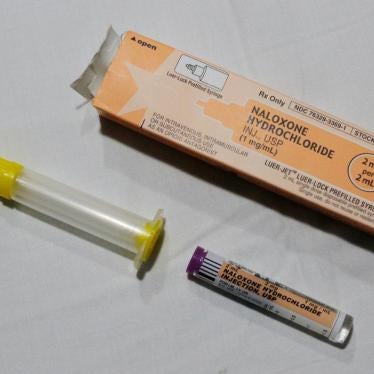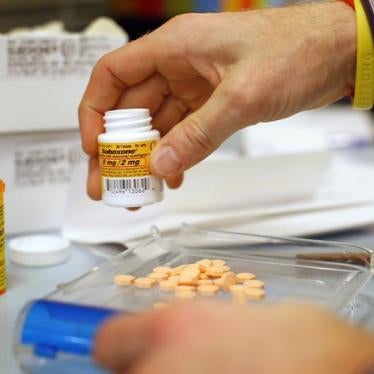The Honorable Paul Ryan
Speaker of the House
US House of Representatives
1233 Longworth House Office Building
Washington, D.C. 20515
The Honorable Mitch McConnell
Majority Leader
US Senate
317 Russell Office Building
Washington, DC 20515
The Honorable Nancy Pelosi
Minority Leader
US House of Representatives
233 Cannon Office Building
Washington, DC 20515
The Honorable Chuck Schumer
Minority Leader
US Senate
322 Hart Office Building
Washington, DC 20515
Dear Speaker Ryan, Majority Leader McConnell, Minority Leader Pelosi, and Minority Leader Schumer,
We, the undersigned organizations, write to express our opposition to the inclusion of the Stop the Importation and Trafficking of Scheduled Analogues (SITSA) (H.R. 2851/S. 1327) in any final compromise legislation between the House opioid package (H.R. 6) and the Senate opioid package (S. 2680).
In June 2018, many of us signed a letter to the House of Representatives urging members to vote against SITSA in the House. Our opposition to this legislation remains unchanged as Congress attempts to reconcile the differences between the opioid legislative packages passed by the House and Senate.
While synthetic opioid overdoses are a very real problem, we believe that including SITSA in a final bill will ultimately prove ineffective in curbing our ongoing epidemic. Instead, SITSA will broadly expand penalties for drug offenses, concentrate power within the Department of Justice (DOJ), punish people who lack criminal intent, and overcriminalize certain behavior.
Although SITSA passed the House, it has not been without strong Congressional opposition. The majority of House Democrats did not support the measure and many Republicans opposed it.[1] House Democratic Whip Steny Hoyer commented that “this legislation lacks clarity that could result in thousands of Americans being incarcerated, potentially for life sentences, thus exacerbating an already over-populated prison system. …[T]hose suffering from opioid addiction need treatment and proper medical care, not more laws that will simply put them behind bars."[2] Further, the House Liberty Caucus produced a statement detailing the extensive and irreversible harms of the past drug war, and implored that SITSA not be employed to revive the criminalization approach to a public drug crisis, as it has “eroded federalism, eviscerated numerous individual rights, entrenched severe discrimination in our criminal justice system, and failed to meaningfully limit the proliferation of illicit drugs.”[3] Those on both sides of the political spectrum recognize the damaging impact that SITSA could have should it pass, and wish to see drug policies that are health-centered.
SITSA has also not passed the Senate, nor was it even marked up in the Judiciary Committee. To add this legislation to a final opioid legislative package would be to ignore the will of the Senate, denying members of the Judiciary Committee a say on issues in their jurisdiction. It could greatly complicate the passage of a final opioid package. Finally, many members of Congress have been working hard to reach agreement on criminal justice reform legislation that would reduce sentences for drug offenses. This bill would undermine these efforts by taking an approach synonymous with the failed war on drugs.
SITSA would give the attorney general virtually unlimited authority to create new drug crimes that carry lengthy, expensive prison sentences. Deciding what is a crime and how it should be punished is Congress’s duty and should not be delegated to an unelected executive branch official. While the attorney general may currently schedule substances, the power to do so is carefully constrained. Currently, the DOJ must obtain the Department of Health and Human Services’ (HHS) approval for scheduling a drug. This is reasonable, as HHS’s drug experts offer informed and data-driven opinions as to which substances belong on each drug schedule. Under SITSA, the Attorney General would be required to consider HHS comments only before permanently classifying substances. In addition to the nearly unfettered ability to permanently schedule synthetic drugs, should SITSA pass the attorney general would have the ability to temporarily schedule drugs for nearly twice as long as currently permitted under law – 5.5 years instead of the current 3 – with no input from HHS.
The proposed changes to the scheduling process under SITSA greatly threaten the American principles of balanced powers. SITSA would grant the attorney general – an unelected government actor – the ability to schedule drugs without oversight from medical professionals while consequently undermining Congress’ responsibility to create criminal law.
SITSA would also overcriminalize synthetic drugs by penalizing individuals who lack any criminal intent. Under SITSA, individuals would face criminal charges and long sentences even if they did not know that they possessed or distributed a particular substance or that the substance had been scheduled, temporarily or permanently. Fentanyl and its analogues are just one example of how we already punish drug offenders with no criminal intent. In December 2017, Robert Perez, U.S. Customs and Border Patrol, testified that “[t]he majority of U.S. trafficked illicit fentanyl is produced in other countries such as China, and is principally smuggled through international mail facilities (IMFs), express consignment carrier facilities (ECCFs, e.g. FedEx and UPS), or through POEs along the Southern land border.” By the time that low-level sellers (who will undoubtedly bear the brunt of SITSA’s punishments) receive drugs including fentanyl or its analogues, most do not know what those drugs actually contain. They are often oblivious to the true content of their product, unknowingly and unintentionally providing users with the deadly drug fentanyl. We believe that any drug offense should require a culpable mental state. SITSA defies this principle, treating low-level dealers with tainted product as if they were knowingly distributing fentanyl-laced substances.
Finally, criminalizing more drugs that trigger harsh penalties does not deter people with substance use disorders from using or buying drugs. Longer sentences do not deter drug use or drug crime; rather, it is the certainty that an individual will be caught and punished quickly that deters criminal behavior. A belief that harsh penalties, such as the 10-year maximum for a first offense of possession with intent of a synthetic substance, deter the drug trade also ignores the impaired reasoning processes of those struggling with addiction. Since the 1980s, the United States has had tough penalties for heroin,fentanyl, and fentanyl analogue use and distribution, yet opioid consumption has actually increased since that time.
While health and public safety do not often have a price tag, it would behoove Congress to consider SITSA’s costs and benefits. SITSA will apply long drug sentences to more people, forcing taxpayers to pay for an increased prison population. Longer sentences and bigger prison populations do not yield the same public safety benefits as policies that would decrease the demand for drugs. Investing in treatment and public health would be a far more effective investment of taxpayer money.
The drug policies of the 1980s and 1990s did not prevent the opioid epidemic or stop synthetic drug use. Congress has shown a continued commitment to righting these wrongs and using more effective strategies to combat and contain drug use and drug epidemics. SITSA would be a major step in the wrong direction. This bill defies our American principles of a balanced government in the pursuit of policy prescriptions proven to be ineffective -- namely, lengthy prison sentences that apply to those who have drug use issues. We ask that both chambers of Congress focus on policies that will increase the availability of drug treatment and reserve taxpayer dollars for more effective public health strategies, not more criminalization.
Sincerely,
American Civil Liberties Union
AIDS Action Committee of Massachusetts
Baltimore Harm Reduction Coalition
Church of Scientology National Affairs Office
Due Process Institute
Drug Policy Alliance
FAMM
FedCURE
Federal Public and Community Defenders
FreedomWorks
Friends Committee on National Legislation
Human Rights Watch
Iowa Harm Reduction Coalition
Justice Strategies
National Alliance of State and Territorial AIDS Directors
National Association of Criminal Defense Lawyers
National Association of Social Workers (NASW)
National Center for Lesbian Rights
National Viral Hepatitis Roundtable
NETWORK Lobby for Catholic Social Justice
North Carolina Harm Reduction Coalition
Open Aid Alliance
Reframe Health and Justice
R Street Institute
Safer Foundation
SIFMA NOW!
StoptheDrugWar.org
Students for Sensible Drug Policy
The Sentencing Project
Washington Office on Latin America








